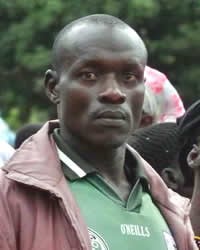Aringa in Uganda

Photo Source:
Anonymous
Used with permission
|
Send Joshua Project a map of this people group.
|
| People Name: | Aringa |
| Country: | Uganda |
| 10/40 Window: | No |
| Population: | 1,042,000 |
| World Population: | 1,042,000 |
| Primary Language: | Aringa |
| Primary Religion: | Islam |
| Christian Adherents: | 1.90 % |
| Evangelicals: | 1.50 % |
| Scripture: | New Testament |
| Ministry Resources: | Yes |
| Jesus Film: | Yes |
| Audio Recordings: | Yes |
| People Cluster: | Sudanic |
| Affinity Bloc: | Sub-Saharan Peoples |
| Progress Level: |
|
Introduction / History
Slave trade was practiced in Yumbe from around 1822 to 1919. In 1919, the Belgian government signed a treaty with the British government to abolish the trade. Idi Amin was from neighboring Koboko and became Uganda's president in the year 1971 and ruled up to 1979. He had a strong influence in Yumbe District.
There was no LRA in Yumbe but several rebel activities were led by others. For example, the West Nile Band front rebel group was led by Juma Aurish, UNRF I AND II were led by Brigadier Moses Ali and Major General Ali Bamuze, respectively. Effects of rebel activities in Yumbe were a reduction of manpower, destruction of property (including buildings, health centers, schools, etc.), displacement of people from their homes, poverty and hunger, religious conflicts (such as the wounding and killing of missionaries in 2001 and 2004). There is now peace, more cooperation and development.
They are primarily located in Yumbe District which is in West Nile (Northwestern) Uganda. Yumbe District's northern border is with South Sudan. The Aringa are also scattered throughout the West Nile and, to a smaller degree, in the rest of Uganda with small numbers doing business in neighboring South Sudan.
What Are Their Lives Like?
They are traditionally hunters and cultivators and they keep small scale livestock, mainly for home use. A growing number are becoming businessmen, though most do farming for at least some of their income and food needs.
They typically have large families and are hard workers.
What Are Their Beliefs?
The Aringa are primarily Muslim with a very small number of Christians. Officially they believe the basic tenets of Islam, but they also believe in the power of ancestral spirits.
What Are Their Needs?
The Muslims response to evangelism is mixed. Some of them feel good and would like to become Christians but fear persecution from other Muslims. Others feel bad when they see Christians doing evangelism, they can chase them away from their homes, insult them, pay no attention to the message, etc. Others pretend to have accepted the message for other personal gain such as money. They need the spiritual hunger it takes to accept Christ no matter what the cost.
Prayer Points
Pray for growth of the church in depth and numbers.
Pray for the completion of the Old Testament translation, which is in progress. The New Testament is currently available in Aringa.